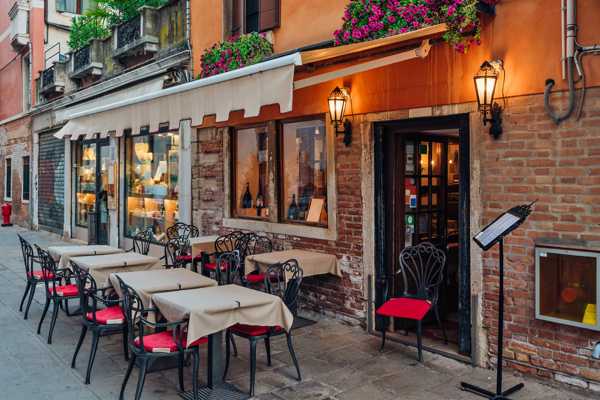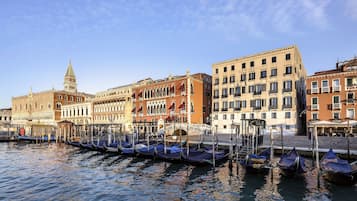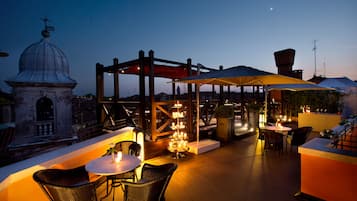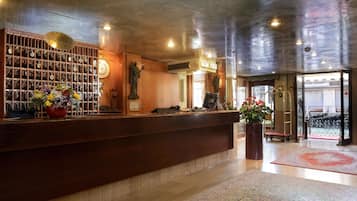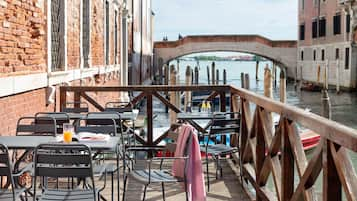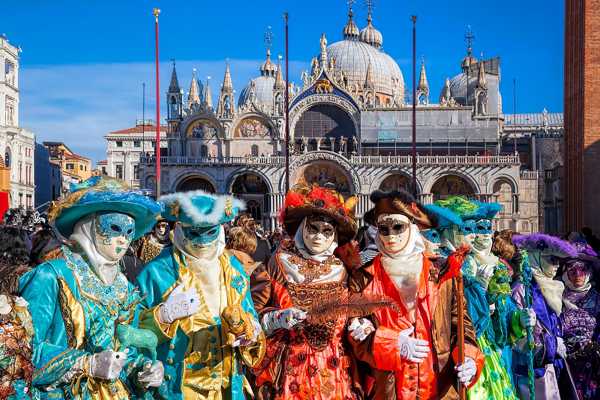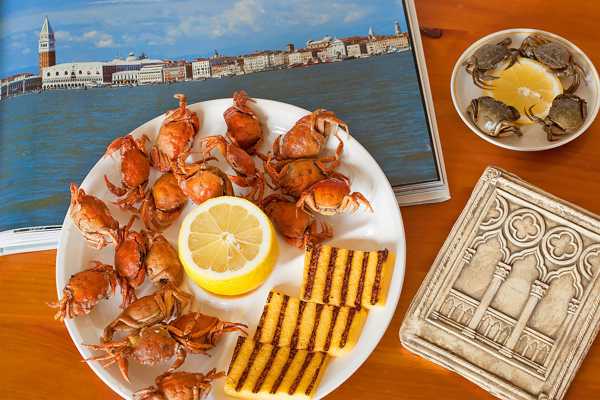Venice is a city of a thousand symbols – Canals, gondolas, carnival masks, friezes adorning the palaces, church mosaics, and architecture with shapes and outlines from far-off worlds. It's impossible to choose one thing it's best known for. It's a city that sought the world, and brought home treasures, riches and inspiration from every land visited. Here, different cultures and distant peoples have rubbed shoulders, giving every street and stone a story to tell.
You can follow an itinerary of the greatest monuments and most praiseworthy art, or you can take a road less travelled, following your heart and eyes from beauty to beauty. We have chosen 10 unusual but utterly fascinating places to visit in a secret and hidden Venice.
- 1
Acqua Alta Bookshop
The ingenious and intriguing floating bookshop

- Budget
- Unusual
Acqua Altadi Venezia is a bookhop and a tourist attraction. To get there, leave the beaten track and continue just beyond the beautiful Chiesa di Santa Maria Formosa (Church of Santa Maria Formosa). As the lagoon's water level rises, the canal runs into the bookshop. The owner made do by filling the space with furnishings that either float or are water resistant. Your book could be in the gondola at the entrance, an old boat or a bathtub. The books themselves form part of the architecture. In the courtyard, you can climb a staircase made of old volumes to look over the surrounding wall, onto a canal. Buy a book to take home a piece of this peculiar, brilliant world.
Location: Calle Lunga Santa Maria Formosa, 5176b, 30122 Venezia VE, Italy
Open: Daily from 9.15 am to 7.45 pm
Phone: +39 041 296 0841
Mapphoto by Dimitris Kamaras (CC BY 2.0) modified
- 2
Saint Lazarus of the Armenians
The little Arab world in the lagoon

- History
- Photo
- Unusual
Saint Lazarus of the Armenians is an island in the Venetian Lagoon that captures the cosmopolitan spirit of a city that made its fortunes trading with far-off worlds. It is near the Lido’s west coast. Since the 18th century, it's been the spiritual centre for an Armenian monastic community, who settled on an abandoned island with a ruined monastery. They renovated the church, constructed buildings, quadrupled the island’s size and founded a printing press, producing literary, scientific and religious works in 36 languages and 10 alphabets. There’s also a collection of over 4000 Armenian manuscripts, an art gallery and a museum containing Arab art and artefacts, including an Egyptian mummy. Get there via vaporetto to San Zaccaria, along the Riva degli Schiavoni waterfront.
Location: Isola di San Lazzaro, 30126 Venezia Lido, Italy
Open: Daily guided visits at 3.25 pm
Phone: +39 041 526 0104
Map - 3
San Pantalon
The gigantic canvas that looks like a fresco

- Budget
- History
- Photo
- Unusual
Don't be fooled by Chiesa di San Pantalon (Church of San Pantalon)’s austere, unfinished facade, near Campo Santa Margherita. Inside, 443 square metres of ceiling are covered in what looks like a spectacular fresco, but is actually an enormous painted canvas, the world’s largest according to locals. Achieved by joining 40 canvases, it will have you craning your neck to admire the depiction of Saint Pantaleon the martyr. A clever trick of perspective makes the church appear larger, as the architecture’s supplemented with painted columns and arches. This mammoth task was assigned to Giovanni Antonio Fumiani, who specialised in stage design. The figurative narration begins with emperor Galerius Maximianus on the throne, followed by his sentence, torture, execution and, in the centre, ascension into heaven.
Location: Sestiere Dorsoduro, 3703, 30123 Venezia VE, Italy
Open: Monday–Thursday and Saturday from 10 am to 12.30 pm, Sunday from 9 am to 12.30 pm and Monday–Thursday and Sunday from 3.30 pm to 6 pm, Saturday from 3.30 pm to 7 pm (closed on Fridays)
Phone: +39 041 272 8611
Map - 4
San Michele Cemetery
The island of majestic tombs

- History
- Photo
- Unusual
A trip to San Michele Cemetery is a good excuse for a ride in a vaporetto. The lagoon contains several islands, but for something different, get off at Isola di San Michele (San Michele Island). It’s a city cemetery but foreigners are also buried here, like composer Igor Stravinsky, poet Ezra Pound and Russian ballet impresario Sergej Diaghilev. In the past, burials took place beside churches, with well-known personalities buried inside them. In the Napoleonic era, cemeteries were banned in inhabited areas for hygiene reasons. So instead the Venetians used Isola di San Michele, outside the city but easily accessible. Until the mid-20th century, every 1 November a pontoon bridge was set up to facilitate visits. The pontoon’s near a side entrance next to the church, the best spot to begin your trip.
Location: Isola di San Michele, 30121 Venezia VE, Italy
Open: Daily from 7.30 am to 4.30 pm
Phone: +39 041 729 2841
Map - 5
Lazzaretto Nuovo and Lazzaretto Vecchio
The quarantine station from the Republic of Venice

- History
- Photo
- Unusual
Lazzaretto Nuovo and Lazzaretto Vecchio were founded when Venice was the hub for trade between East and West. The traffic brought riches, but also risked transmitting diseases. In the late 1400s, the Venetians had an innovative idea that would be imitated worldwide: they designated 2 islands for storing and checking suspicious goods and for looking after infected passengers. And so the 2 Lazzaretti (quarantine stations) were born. Lazzaretto Nuovo, along Canale di Sant’Erasmo (Sant'Erasmo Canal), was for monitoring people and goods. Your visit includes an exhibition in the buildings and archaeological site, but there’s also a nature path around the walls. Lazzaretto Vecchio, near the Lido's coast, was used to look after infected people. The island has special Sunday visiting hours, or you can book a guided tour.
Location: 30100 Venezia VE, Italy
Open: Lazzaretto nuovo: April–October: Saturday and Sunday from 9.45 pm to 4.30 pm (other days and times subject to booking)
Phone: +39 041 2444 011
Map - 6
San Servolo Island Museum (Mental Asylum)
The rooms of the 'follia reclusa'

- History
- Photo
- Unusual
Visiting the San Servolo Island Musuem, an old mental institution, may make you shudder, but the Museo del Manicomio (Mental Asylum Museum) is an interesting cultural, historical and naturalistic experience. In a beautiful park on San Servolo island stands a former monastery. It was later used as a hospital, first for injured soldiers, then for the mentally ill. The ‘La follia reclusa’ (secluded madness) exhibit retraces the hospital's scientific history and personal stories, with documents, medical records, paintings and objects created by patients, restraints like arm binders or ankle blocks, photos of life on the wards, the piano used in music therapy, and electroshock tools. There’s an anatomy room and 18th-century pharmacy displaying over 200 different containers on the original shelving.
Location: San Servolo, 30124 Venezia VE, Italy
Open: Monday–Friday 2 visits a day starting at 9 am and 2 pm, Saturday and Sunday guided tours subject to booking from 9 am to 4 pm
Phone: +39 041 862 7167
Map - 7
The Flooded Crypt of San Zaccaria
When water creates special effects

- Budget
- History
- Photo
- Unusual
The flooded crypt of San Zaccaria, near Piazza San Marco (St Mark's Square) is in one of the most beautiful churches in Venice, with its 15th-century facade, artistically rich interiors and so much more. From the cappella di San Tarasio (San Tarasio Chapel), in one of the apses, descend the steps to the crypt, one of the building's most impressive features, easily missed by oblivious tourists. It’s split into 3 aisles with columns and cross vaults. The Most Serene Republic of Venice’s first Doges are buried here. Nowadays, as in many Venetian buildings, the underground area is constantly flooded. The water has transformed it into a unique, intriguing space. The columns’ and vaults’ reflection double the space, creating a sense of depth and new perspectives.
Location: Campo S. Zaccaria, 4693, 30122 Venezia VE, Italy
Open: Daily from 10 am to noon and 4 pm to 6 pm
Phone: +39 041 522 1257
Map - 8
The Borges Labyrinth
Will you find your way?

- Families
- Photo
- Unusual
The Borges Labyrinth is not the labyrinth of streets and canals, but a real, fiddly route hemmed in by hedges. Created on San Giorgio Maggiore Island, it’s dedicated to Jorge Luis Borges, who had close ties with Venice. The city wanted to pay homage to him with this landmark. It seems unusual, but it's linked to the Argentinian writer's work: labyrinths are a recurring theme of his, symbolising the world's complexity and man's difficulty in finding his way. It's a short vaporetto ride away from Piazza San Marco (St Mark's Square). When you get off, go around the basilica to reach your destination. It’s impressive to look at: the route’s over a half-mile long, formed of over 3000 boxwood plants.
Location: Isola di San Giorgio Maggiore, 30133 Venezia VE, Italy
Open: Saturday–Sunday from 10 am to 5 pm
Phone: +39 041 271 0211
Map - 9
Antonio Canova's Tomb
Masonic symbols in the Basilica dei Frari

- Budget
- History
- Photo
- Unusual
Visit Antonio Canova's tomb if your like Masonic symbolism and unearthing enigmatic, allegorical language in architecture and monuments. It's in Basilica dei Frari (Basilica of Santa Maria Gloriosa dei Frari), near Campo San Polo. Even the building’s shape is strange, especially given it's in a church. The pyramid represents the great architect of the universe, the Freemasons' divinity. Want to crack hidden codes in statues? There's an angel with open wings, a sleeping lion with a book between its paws, a youth holding a torch, a veiled woman and other figures. They tell a story of the soul’s immortality, an artist’s wisdom and his inspiration. Mysteries and strangeness don't stop there: the tomb only contains Canova's heart – his body is in his birthplace, Possagno.
Location: San Polo, 3072, 30125 Venezia VE, Italy
Open: Daily from 7.30 am to 7 pm
Phone: +39 041 272 8611
Mapphoto by Matthew Clemente (CC BY-SA 2.5) modified
- 10
Dragon bones in the Basilica of Saint Mary and Saint Donatus
Medieval fake news

- History
- Unusual
Behind the high altar in Basilica di Santa Maria e San Donato (Basilica of Saint Mary and Saint Donatus) on the island of Murano you'll see the enormous dragon's vertebra. They say the bones (probably a whale’s) belong to a terrifying creature defeated by Saint Donatus. The tale dates to the 12th century, when the saint's remains were transferred to the church. Miracles were attributed to him, including slaying a monster with the sign of the cross in battle. Shortly after the relic's arrival, the animal bones were also brought to the church. They're still displayed but are somewhat concealed amongst the mosaics and artwork. Try to look through the eyes of a medieval Venetian; you may still glimpse a dragon.
Location: Calle S. Donato, 11, 30141 Venezia VE, Italy
Open: Daily from 9 am to 6 pm (holidays from 12.30 pm to 6 pm)
Phone: +39 041 739 056
Map

